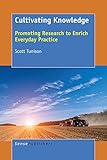Cultivating knowledge : promoting research to enrich everyday practice / Scott Tunison, University of Saskatchewan & Saskatoon Public Schools, Canada.
Material type: TextPublisher: Rotterdam ; Boston ; Taipei : Sense Publishers, [2016]Copyright date: �2016Description: 1 online resource (xi, 456 pages)Content type:
TextPublisher: Rotterdam ; Boston ; Taipei : Sense Publishers, [2016]Copyright date: �2016Description: 1 online resource (xi, 456 pages)Content type: - text
- computer
- online resource
- 9789463006033
- 9463006036
- 9463006036
- 370.72 22
- LB1028
Text in English.
"Over the last decade or two, there has been increasing consensus that academic research, if used judiciously to guide practice, improves both educational policy and pedagogy ultimately leading to better outcomes for students. Yet, despite this potential, there remains a deep ravine between the body of knowledge built through research especially at the intersection between specific interventions and improved student achievement and the actions taken by policy makers, administrators, and classroom teachers in their regular practice. There are myriad reasons for this research-practice divide. Among them is that it is difficult for district-based people to access primary research. Furthermore, multiple waves of well-intentioned research-based but largely unsuccessful school reform efforts have resulted in skepticism among practitioners about research and, at the same time, damaged researchers credibility in the field. This book is divided into three broad areas. First, it develops an engaging analysis of the root causes for the research-practice gap in education. Second, it describes the framework developed and used in a public school district by the author to address the root causes and provides evidence of its efficacy to facilitate greater incorporation of research into school- and district-level practice. Through a process the author calls Knowledge Cultivation, the framework uses weekly research summaries for district leaders that are relevant to their real-time issues along with suggestions about ways in which the research might be useful. The final section of the book includes the actual research summaries used by the author over a five-year period"--Back cover.
Setting the headlands : defining the shape of the field -- Give the people what they want!: (or figure out what they need and give them that) -- "Making the jump": clearing the gap between research and practice -- What organisational strategies might make knowledge cultivation more successful? -- Knowledge cultivation in a public school district: what does it look like in practice? -- Simple jumps -- Adding complexity and "danger": the embedded KC model -- Reflections of knowledge cultivation: have we enriched everyday practice with research? -- Professional reading series issues.
Includes bibliographical references (pages 443-456).
Print version record.
There are no comments on this title.

